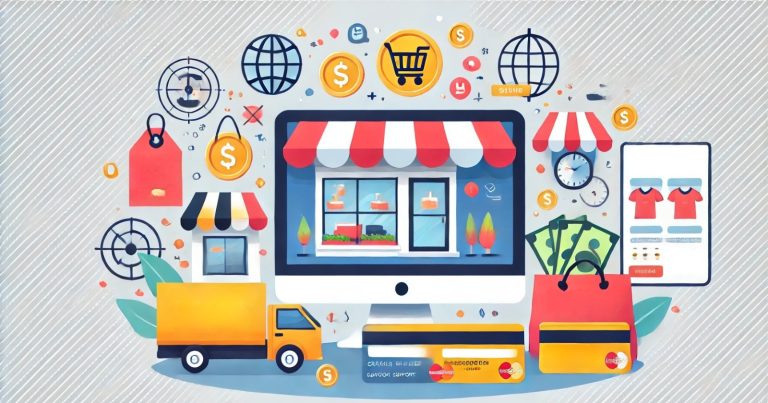Business promotion is a term used to describe the numerous strategies and methods employed by companies to maximize their visibility, draw consumers, and increase sales. Business promotion is a wide domain of work that begins from advertisements to promotions which all contribute to a good market presence. Effective promotion of your business leads to better brand recognition, higher customer acquisition and retention, and enables growth opportunities. This article will elaborate on the importance of business promotion, its objectives, types and benefits, and some handy tips for students, entrepreneurs, and marketers.
What is Business Promotion?
Business promotion is a series of steps to enhance a business’s visibility and sales. It is an important part of marketing that helps organizations get clients, increase brands and improve their position in the market. These promotions are direct or indirect and can be conducted using various tools such as methods of event management, advertising, public relations, or digital marketing.
A sample of Business Promotion is the new restaurant promoting a 10% Discount on the first visit to appeal to customers is a standard promotion strategy to stimulate traffic and buzz about the company.
Objective of Business Promotion
Businesses promote their products or services to achieve sales, gain popularity, and develop brand loyalty. With the correct promotional actions, companies can also achieve objectives aligned with their universal method.
- Generate Sales: The most relevant goal is to increase sales of your goods or services. Discounts, offers, and coupons can speed up customers’ buying decisions. These promotions have a sense of urgency that drives immediate sales and transaction volume.
- Establish Brand Recognition: Business promotion activities More familiarise the target audience with a brand’s products, services or values. Good promotions showcase what makes a brand special and keep it in consumers’ top-of-mind. Being in long-term visibility can help you attract more customers and boost your brand awareness.
- Get New Customers: Promotions are (generally) targeting new customers and exposing them to the company. Discounts or samples can entice first-time buyers, who can later become repeat customers. Targeted promotional campaigns can effectively grow a brand’s audience.
- Retain Existing Customers: Businesses can use loyalty programs or special discounts to keep their existing customers engaged. The continuous interaction adds to customer loyalty and keeps customers returning. Rewarding repeat customers consistently can enhance retention rates and create brand ambassadors for life.
- Capture a Larger Market Share: Through effective promotions, businesses can capture a larger market share, making their brand more competitive. Promotions can provide a competitive advantage by attracting new customers and keeping existing ones. A larger market share correlates with influence and profitability.
- Moves Out Stock or Launches New Products: Companies can use promotions to clear the balance of product stock or to use new products in the market. Businesses also use seasonal sales and clearance events to clear out unsold stock and increase revenue. Advertising new products creates hype and rapidly gains consumer’s interest in new items in the market.
Types of Business Promotion
There are several types of business promotion, each serving a different purpose depending on the target audience, objectives, and marketing strategy. Below are the major types of business promotion.
Direct Promotion
Direct promotion communicating directly with customers in personalized messages. Businesses communicate special offers or new products using emails, direct mail, telemarketing, etc. These promotions are only directed at your customer base and potential leads, making the message more timely and relevant. This method allows businesses to establish a more intimate connection with customers and boost conversion rates. When targeting a niche audience, it can be extremely powerful and useful to send them customized offers.
Sales Promotion
Sales promotion is a short-term technique designed to accelerate sales. Offering discounted rates, free samples, or bundles to drive short-term sales. Sales promotions create a sense of urgency, prompting customers to take action quickly before the promotion ends. Limited-time discounts, coupons, gifts with purchases and contests are sampling techniques that can quickly increase sales volume and allow companies to sell through their inventory. This concept works great for sales in the short term.
Public Relations (PR) Promotion
Strategies for PR promotion revolve around creating a positive image of a company and maintaining positive relationships with the media and the public. This is a long-term approach that focuses on how a company is perceived and works to make sure it has a good reputation. Examples of PR promotion include press releases about noteworthy news, funding of events or charities, and media coverage through newspapers or TV. Such functions boost brand awareness and build trust among customers and potential in the marketplace.
Digital Promotion
Digital promotion uses internet tools to connect with more people. In this digital media age, advertisements are colocated with social media marketing, search engine optimization (SEO), and influencer marketing. Businesses can market products and offers through social media using platforms like Facebook, Instagram, and Twitter. SEO optimizes websites for higher search engine placement, driving natural traffic, while influencer marketing aligns with popular individuals to enhance credibility and extend reach. Digital promotion creates an impactful avenue through which you can reach your target audience en masse, wherever they are located throughout the world.
Advertising
Advertising is a traditional technique where you pay to promote your products or services through media channels (for example: TV, radio, print, online etc). This technique allows businesses to enhance visibility and reach a bigger audience. Through digital ads, we can target it to a great degree, or mass marketing through traditional media. They show off the essential features or benefits while gaining attention and generating sales. A well-planned ad strategy keeps businesses in the competition and in plain sight in saturated markets.
Benefits of Business Promotion
There are various advantages of business promotion that aid employers in expanding and carrying out well in a powerful industry.
- More Sales: Using promotional activities will encourage customers to buy immediately, increasing sales. Discounts, limited-time offers or exclusive bundles provide a FOMO. These promotions bring in buyers who may not have purchased otherwise, increasing sales and revenue. The right offer can boost immediate and repeat sales significantly for businesses.
- Create Brand Awareness: With a good promotion, the business can make new and existing customers aware of it. With the potential of reaching a larger audience using methods such as social media, influencer marketing or targeted marketing, companies can utilize much larger markets. The brand’s consistent presence helps build brand recognition and loyalty when customers get to know it over time, setting the stage for long-term success.
- Sales for Future Growth: Promotions can also help drive future growth by building a loyal customer base. The personalized discounts and exclusive deals make the customers feel valued and appreciated. Interactive promotions also give businesses an opportunity to solicit feedback and improve products while creating meaningful connections that lead one-time buyers to become loyal patrons.
- Competitive Advantage: Businesses stand out from their competitors with unique promotional card offers. These promotions can come in the form of discounts, loyalty programs, or even exclusive events, helping brands rise through the noise. Offering something different makes it easier for businesses to bring customers in, regardless of where they stand in relation to their competition. If you want to stay ahead, it helps to be memorable.
- Strengthened Reputation: Positive promotions, including community sponsorships/charity involvement, can build a brand’s reputation. Philanthropic Giving Supporting important causes creates trust and admiration. This not only contributes to an improved public perception, but the brand image will strengthen through time as well.
- Clearing Out Excess Inventory: Promotions are a great way for businesses to move unsold stock or excess items quickly. Discounts, flash sales, and bundles help businesses move inventory that is not turning fast. This ensures the availability of newer products in the future and also decreases storage costs, eventually maintaining cash flow and operational efficiency.
Example of Business Promotion
A clothes shop holds a seasonal discount promotion in the off-season, giving great deals on winter clothes in the summer. It lets us clear out last season’s stock and catches customers searching for deals. Being able to drive foot traffic and further sales at a traditionally slower time of year allows the store to balance inventory alongside sales, generating a clear financial benefit.
A cosmetics label runs a BOGO (buy one get one) deal, where consumers get one product free with the purchase of another. Not only does this promotion allow the customer to try new products, but it also drives sales. It also helps keep customers satisfied by providing them with value perks, thus, in turn, increasing the likelihood of repeat business and helping grow the brand’s customer reach.
Business Promotion FAQs
1. How to effectively promote a business?
Good business promotion is knowing your target audience, selecting the appropriate promotional methods (sales, digital, PR), and providing customer value.
2. What is promotion versus advertising?
Promotion is short-term promotions such as discounts and sales, whereas advertising is long-term and aims at brand awareness.
3. Is business promotion possible without the expenditure of money?
Yes, word-of-mouth, social media, and PR campaigns can promote business too, which may not need much investment.
4. What are the advantages of business promotion?
Business promotion boosts sales, generates awareness about the brand, attracts new customers, and makes customers loyal.
5. What are a few examples of business promotion?
Some examples are Discounts, sales campaigns, social media campaigns, and influencer collaborations.


